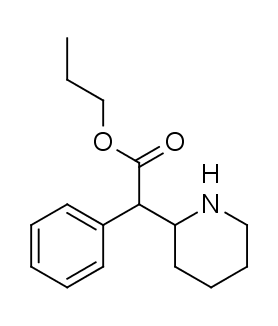Summary
Propylphenidate, sometimes called PPH, belongs to the class of piperidine-based stimulant drugs. It shares a close structural relationship with methylphenidate, differing primarily in replacing the methyl ester with a propyl ester. Notably, in April 2015, the United Kingdom classified Propylphenidate as a Temporary Class Drug due to its unauthorized distribution and sale as a designer drug.
| Identifiers | |
|---|---|
| IUPAC name | |
| CAS Number | 1071564-47-0 |
|---|---|
| PubChem CID | 91844465 |
| ChemSpider | 52085111 |
| UNII | 0Q064445GT |
| Chemical and physical data | |
| Formula | C16H23NO2 |
| Molar mass | 261.365 g·mol−1 |

Legal status
As of January 26, 2016, Propylphenidate became prohibited in Sweden, and it has been illegal in Finland since 2017.
FAQ
- What is Propylphenidate?
- Propylphenidate, or PPH, is a stimulant drug in the piperidine class. It is structurally related to methylphenidate, with the key difference being the substitution of the methyl ester with a propyl ester.
- How does Propylphenidate work?
- Propylphenidate primarily affects the central nervous system as a dopamine reuptake inhibitor. This means it increases dopamine levels in the brain, leading to stimulating effects, increased alertness, and improved focus.
- Is Propylphenidate legal?
- The legal status of Propylphenidate varies by country. It was banned in the United Kingdom as a Temporary Class Drug in April 2015 due to its unapproved sale as a designer drug. It is also illegal in Sweden since January 26, 2016, and Finland since 2017.
- What are the effects of Propylphenidate?
- As a stimulant, Propylphenidate may produce effects similar to other drugs in its class, such as increased energy, alertness, enhanced mood, and improved concentration. Users may experience a sense of euphoria and increased sociability.
- Are there any risks or side effects associated with Propylphenidate?
- Propylphenidate may lead to several side effects and risks, including increased heart rate, elevated blood pressure, insomnia, anxiety, and potential addiction or dependency. Long-term use or high doses can severely affect physical and mental health.
- Can Propylphenidate be used for medical purposes?
- Unlike its close relative, methylphenidate, used to treat attention deficit hyperactivity disorder (ADHD), Propylphenidate is not approved for medical use and is considered a recreational drug.
- Is Propylphenidate the same as methylphenidate (Ritalin)?
- While both drugs are related and have similar mechanisms of action, Propylphenidate is a distinct compound with unique properties. They are not the same, but they share some similarities.
- Is Propylphenidate addictive?
- Yes, like many stimulant drugs, Propylphenidate has the potential for addiction. Prolonged or excessive use may lead to physical and psychological dependence.
- Is Propylphenidate safe?
- The safety of Propylphenidate is a subject of concern. Like other stimulants, it poses risks, especially when used inappropriately or in high doses. It is essential to be aware of these potential risks and use the substance with caution, if at all.
- Is Propylphenidate available for research purposes?
- While some research has been conducted on Propylphenidate, it is generally not approved for research or medical use. Researchers should exercise caution and adhere to relevant regulations when working with this substance.
References
- Methylphenidate-Based New Psychoactive Substances (NPS) ReviewThe Advisory Council on the Misuse of Drugs published a comprehensive review on Methylphenidate-based New Psychoactive Substances (NPS) on March 31, 2015. This report explores the evidence surrounding the use and potential harm associated with these substances, shedding light on the risks and effects of this class of drugs.
- Folkhälsomyndigheten’s Swedish ReportIn November 2015, Sweden’s Folkhälsomyndigheten released a report titled “31 nya ämnen kan klassas som narkotika eller hälsofarlig vara” (translated to “31 new substances can be classified as narcotics or hazardous substances”). This Swedish report addresses emerging psychoactive substances and the potential risks they pose to public health and safety.
- Valtioneuvoston Asetus – Prohibiting Psychoactive SubstancesThe Valtioneuvoston asetus (Finnish Government Decree) regarding the prohibition of psychoactive substances that are sold in consumer markets is a crucial regulation. This decree plays a role in controlling and banning substances that have the potential to cause harm when used recreationally. It is essential in the effort to safeguard public health and wellbeing.